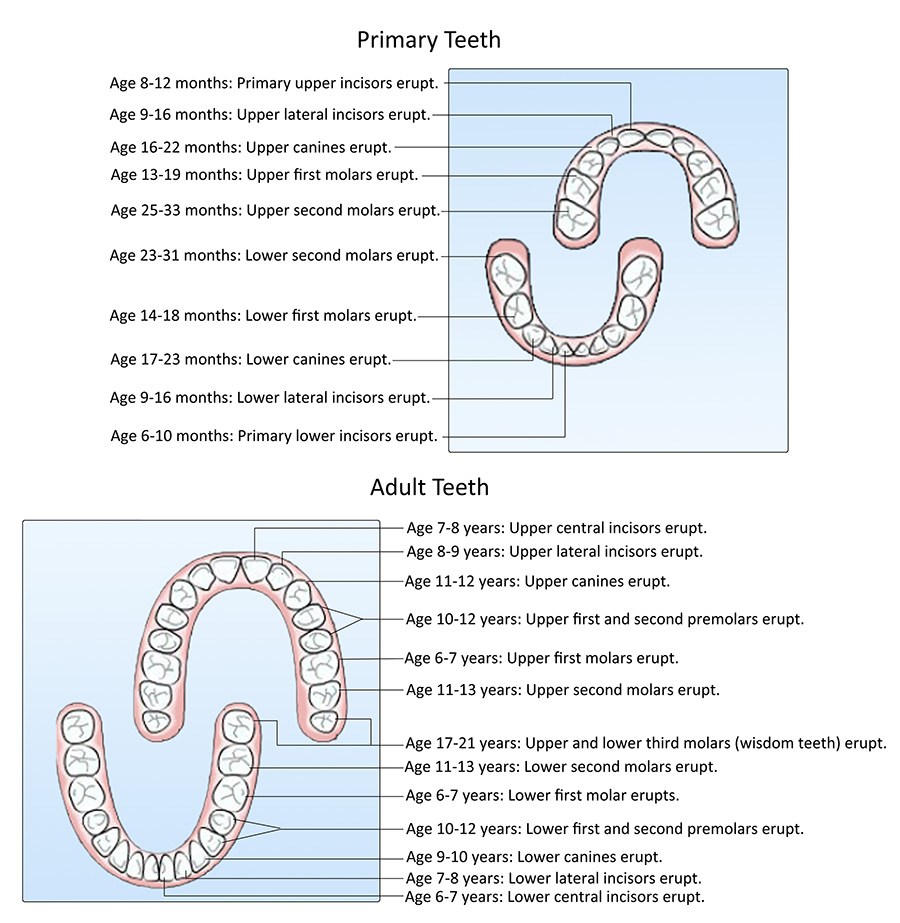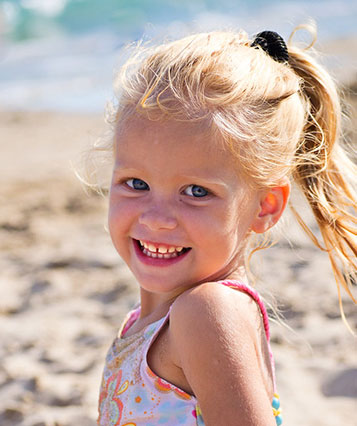Primary Teeth
When a baby is born, we are in awe of their sweet toothless smile. However, hidden underneath that gummy smile are the crowns of the 20 “baby teeth” or primary teeth almost completely formed. The primary teeth gradually erupt through the gums beginning as early as six months of age. Most children will have their full set of 30 primary teeth by three years of age. At the office of Brent J. Porter D.D.S., your Santa Cruz pediatric dentist, our primary focus is keeping those new teeth cavity free.
Children will have these primary teeth during early childhood through the age of 12 to 13 years old. These teeth serve as ‘training wheels’ for the permanent teeth that are developing beneath them. The primary teeth in your child’s mouth are smaller in size and usually whiter in color than the permanent teeth. Although they eventually fall out to make room for permanent teeth. These primary teeth serve an important purpose and should be cared for the same way as the permanent adult teeth. If we can teach children how to care for these temporary teeth, they will be experts by the time the permanent teeth erupt.
Tooth Eruption
Did you know that primary teeth nearly always erupt from the gums in pairs? The four front teeth (two upper central incisors and two lower central incisors) usually erupt first, between six to 12 months of age. The next four teeth to erupt are the lateral incisors, the teeth next to the central incisors. Then comes four first molars, four canines (the pointed teeth), and finally four second molars. Although every child is different, most toddlers have all 20 primary teeth in place between their second and third birthdays. Healthy primary front teeth remain in place until approximately age six, when they begin falling out in an order similar to which they appeared.
Tooth Eruption Chart

Loosing Teeth
After the eruption of all the primary teeth, the mouth remains stable for about three years. Soon after your child turns four years old, the jaw and facial bones of your child begin to grow. This creates larger spaces between the primary teeth. This growth process provides the necessary space for the larger permanent teeth to emerge through the gums.
At approximately age six, your child will begin the excitement of losing their first tooth. As the new permanent teeth develop beneath the gums, they cause the root of the primary tooth to dissolve. This natural process allows the primary teeth to become loose and simply fall out.
Between the ages of six to eight, your child will lose eight primary teeth including the top and bottom central and lateral incisors. Enjoy the toothless photos of your child as they will lose their four front teeth on top and bottom in a short period of time. After this rapid fire with the front teeth, there will be a two-year break.
Between the ages of ten to 13, your child will lose the remaining primary teeth. At approximately age ten, the next four baby teeth a child will lose are two lower canines and two upper first molars. At about age 11, they typically will lose two lower first molars. Finally, around age 12, your child will lose two upper and two lower second molars, as well as two upper canines.
Do not be alarmed if your child loses their teeth faster or slower than this. You may have a child who has lost all their baby teeth by the age of ten. You may have a child with a few baby teeth left in their mouth at age 14. The actual ages are not as important as the pattern of the loss and eruption of the permanent teeth. If your child’s permanent tooth is erupting before the loss of the primary tooth, they may need a little help getting it out. Please consult Dr. Porter if you have any other questions about your child losing their baby teeth.
Importance of Primary or Baby Teeth
As soon as your child gets their first tooth or at the age of 12 months, this is the time to bring them in for their first visit. It is very important to care for your child’s primary or baby teeth and keep them in place until they are naturally lost. There are several reasons why these primary teeth are so important.
- They help your child chew their food to maintain good nutrition.
- They are pivotal for involvement in your child’s speech development.
- They naturally hold space for your child’s permanent teeth.
- They promote a healthy smile that helps your child feel good about the way they look.
Parents sometimes think that baby teeth do not require extensive care because they will eventually fall out. However, it is important to consider that your child's permanent teeth are developing directly beneath those baby teeth. Baby teeth help to guide your child’s permanent teeth into place. They play an important role in your child's long-term dental health. Dr. Porter and team will explain and demonstrate proper brushing and flossing technique to you and your child.
For more information please contact the office of Brent J. Porter D.D.S., Santa Cruz Children’s Dentist (831) 459-9802



